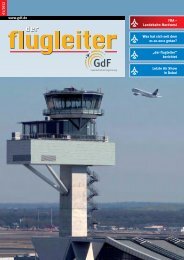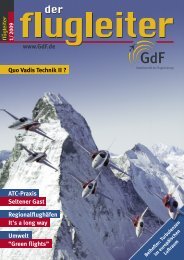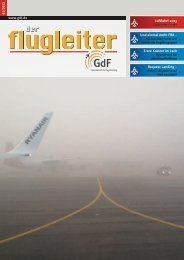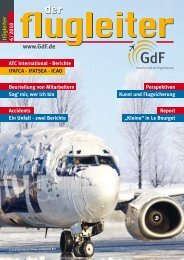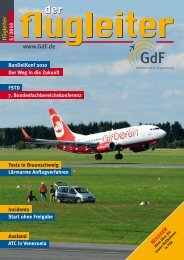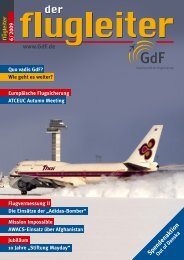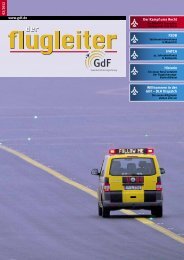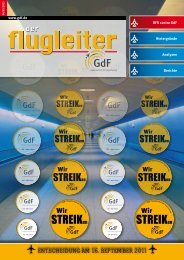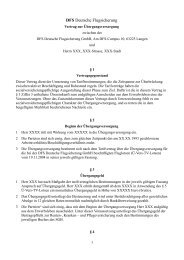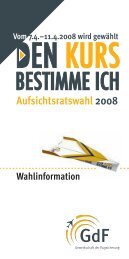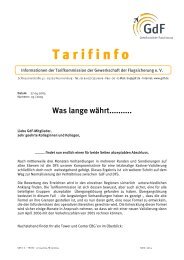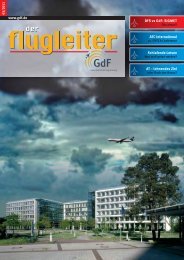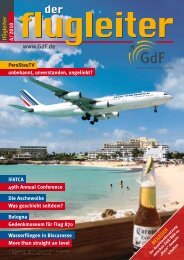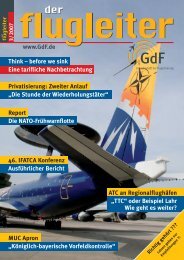als PDF
als PDF
als PDF
Sie wollen auch ein ePaper? Erhöhen Sie die Reichweite Ihrer Titel.
YUMPU macht aus Druck-PDFs automatisch weboptimierte ePaper, die Google liebt.
der flugleiter 2009/03<br />
Safety<br />
18<br />
Safety Justice<br />
remedial action to the system that ATM requires a<br />
mandatory incident reporting system and a voluntary<br />
reporting system in order to improve the current system.<br />
Some of these incidents are even investigated<br />
by several Accident Investigation Boards following the<br />
Annex 13 recommendations of ICAO. These investigations<br />
have to take place under the umbrella of a Just<br />
Culture philosophy which can <strong>als</strong>o be defined as a<br />
cornerstone in the process of Organizational learning.<br />
This just culture is defined by IFATCA/EUROCONTROL/<br />
ECAC as: A culture in which front line operators or<br />
others are not punished for actions, omissions or decisions<br />
taken by them that are commensurate with<br />
their experience and training, but where gross negligence,<br />
wilful violations and destructive acts are not<br />
tolerated.<br />
Just culture as a means to achieving the ultimate goal<br />
to have a safety system which is one of constant improvement<br />
facilitated by a free flow of safety information<br />
with the objective (next to an increase of safety<br />
information and an antidote against nil reporting system)<br />
to achieve a balance between the interests of<br />
safety (e.g. protection of safety information) and those<br />
of a proper administration of justice. This is when<br />
we have discovered that reporting for an ATCO is a risky<br />
business as it can lead directly to appearing in front<br />
of a prosecutor and legal investigation for a wrongdoing<br />
at the penal code level.<br />
Why accident investigators prepare the ground for<br />
criminalization of operational staff?<br />
Like in an accident some of the incidents IFATCA has<br />
been involved in have found out that the accident investigators<br />
–sometimes lack sufficient ATM knowledge<br />
or do not have any basic systemic safety approach<br />
in the way they are conducting the investigation.<br />
Many of the reports of the AAIB are written in a judgmental<br />
way – which are then used in those terms (or at<br />
least consulted by the prosecutors). All this is of<br />
course not foreseen in Annex 13, neither in the attachment<br />
Echo of ICAO – however it is a trend we were able<br />
to recently observe.<br />
ATCOs are being «ordered» by rules and procedures to<br />
report incidents, to give interviews as witness to the<br />
AAIB and to find themselves then accused for a crime<br />
(such as endangering public transport, or other penal<br />
code articles – depending on the gravity of the accident<br />
or incident), which they have, through their testimony<br />
(in good faith) to the AIIB investigator given–<br />
ammunition to have them indicted. Mind boggling!<br />
Proper training of Investigators<br />
and court expert needed?!<br />
IFATCA has found out that most of the AAIB around<br />
the world, lack sufficiently well educated and trained<br />
ATC investigators, which have learned what it means<br />
to look at an incident from a systemic point of view.<br />
Further, IFATCA is amazed to see that around the world<br />
that states ignore Annex 13 fundament<strong>als</strong> and prosecutors<br />
are allowed to use the AIIB reports for their investigations,<br />
maybe stemming from the fact that data<br />
from safety investigation are evidence and judicial investigation<br />
will use this evidence. (see Dutch Safety<br />
Board’s first publication after the crash of the Turkish<br />
aircraft in Amsterdam).<br />
When confronted with court tri<strong>als</strong> – IFATCA has been<br />
amazed in some cases to see – who is acting as ATC<br />
experts of prosecutors/court. In other cases these experts<br />
have never visited an ATC facility and do not separate<br />
reality from the movies i.e. what they have seen<br />
in the film called «Pushing Tin». IFATCA believes that a<br />
proper training is needed for ATC experts (including<br />
specialist aviation lawyers – or specially trained AT-<br />
COs) in both the investigation teams but <strong>als</strong>o in the<br />
case of a prosecutor or a court needing ATC expertise.<br />
These people have to be trained and understand the<br />
systemic safety approach otherwise we will continue<br />
to see an increase of incident reports being transferred<br />
to a prosecutor or lead to condemnation based on<br />
judgmental behavior of these so called experts.<br />
Conclusion<br />
There is a need to be sure that the future performance<br />
based ATM system does not increase the criminalization<br />
of front end operators for the purpose of performance<br />
measurement. ATCOs do not go to work to<br />
commit a crime. They are striving to do the best in any<br />
given situation. The systemic approach to the current<br />
and future ATM system is clearly indicating – that if<br />
high risk or complex system do fail – it is a failure of<br />
the system and not a failure of an individual. If you<br />
end up with the conclusion that the reason for an incident<br />
was Human Error then this will not be the end it<br />
will be the starting point for an investigation as there<br />
is deeper trouble inside the system (Dekker). A court<br />
case will not always improve safety neither will it be<br />
always just. To avoid any kind of cut and dried opinions<br />
get us at least a recognition of the potential misrepresentation<br />
and or miscarriage of justice of the<br />
ATCO by having processes in place that ensures that<br />
fairness in representation by competent persons is in<br />
place.



